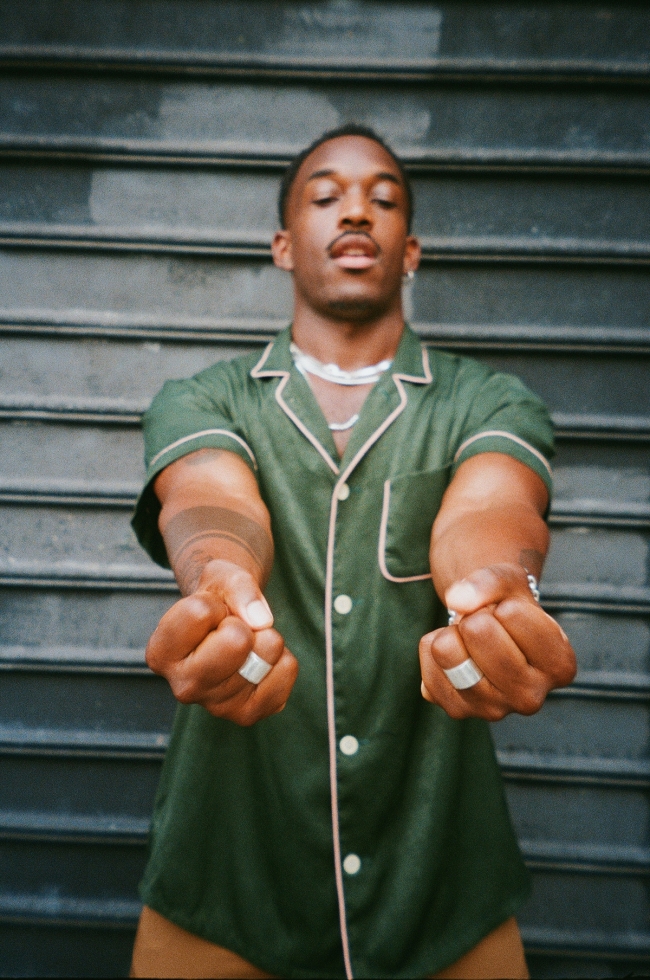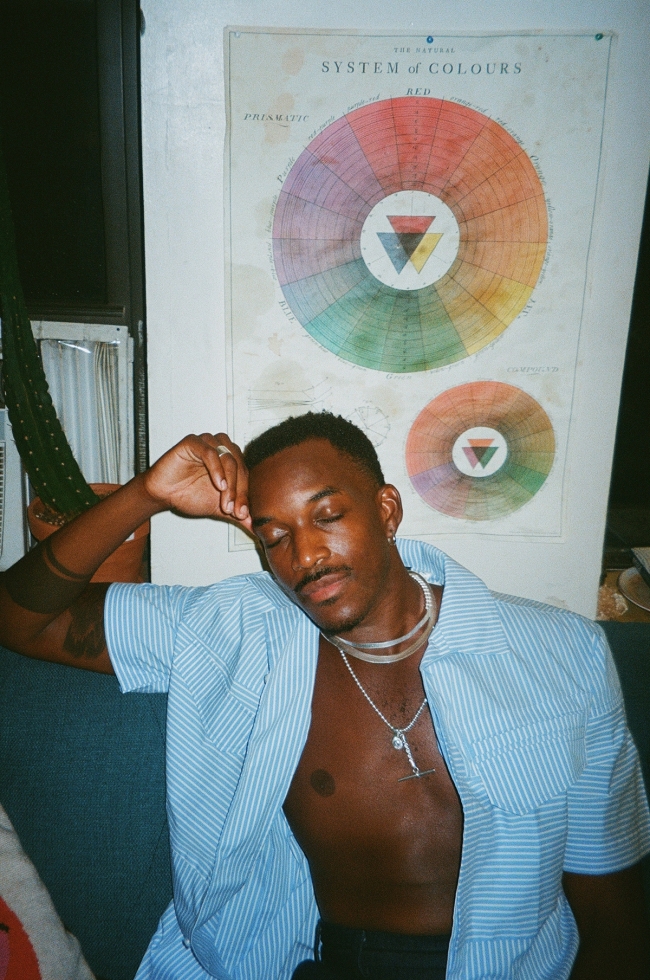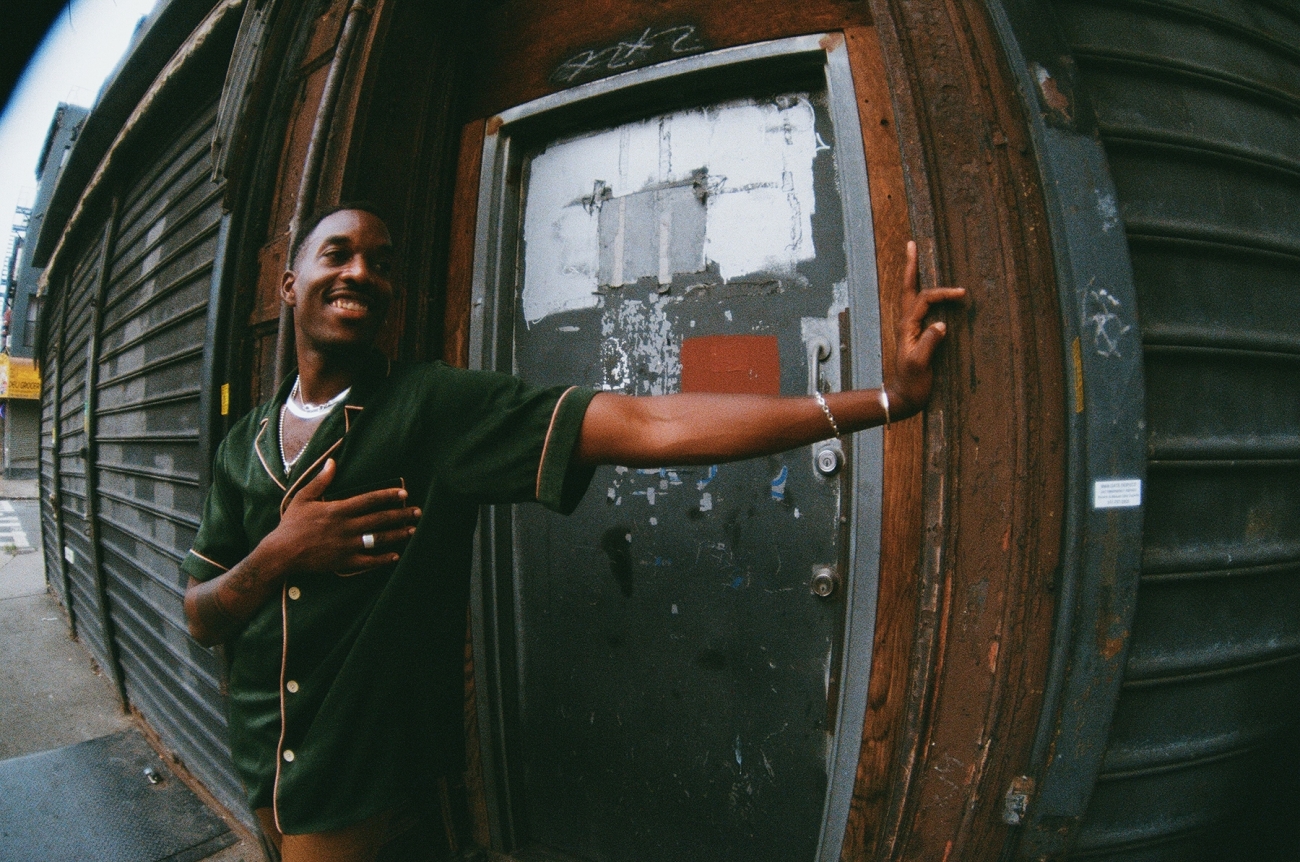Photography Hannah Sider
Fashion Von Ford
Interview Amy-Jo Breach
“I’m going to show up to work black. I’m going to show up to work proud of my blackness. I’m going to refuse to be less black in a way that I have not yet been doing.”
Facing unprecedented isolation, New York City appears desolate. A ghost town cries out for life. Sidewalks hunger for footsteps. The new world seems frozen but change brews under the surface. At the forefront of this shift is actor, musician and activist Britton Smith. Fighting for acknowledgment, accountability, and action, Britton is driving forward the movements to improve our shared experience. Revolutionary beliefs of self-love and pride are not something we have to gain, according to Britton, rather, we must uncover them deep within ourselves and bring them to the light.
As the city thaws back to life after a chilling remoteness, photographer Hannah Sider steps out with stylist Von Ford to capture one of New York’s finest. For Britton, the notion of freedom sits front and centre in his heart as he seeks the liberation of all. It is through music that he and his band, Britton & The Sting, create a space of unity and celebration, and in this feature we discover how, amidst a global lockdown, while streets are silent, voices are heard. Stories are told and opposition against unjust systems ripple across America, echoed by the rest of the world.
As president and co-founder of the Broadway Advocacy Coalition, Britton seeks to amplify the voices of those most directly affected by issues of systemic racism and offer education to those who aren’t. Starring in the Broadway production Be More Chill after appearing in Shuffle Along and After Midnight, Britton successfully used his skills and contacts to create the 'Public Accountability Pledge' which currently sits above 7,000 signatures from industry professionals, as well as hosting a three-day forum titled Broadway for Black Lives Matter Again, encouraging the push for reform and accountability within the industry. Join us as we dive into the world of Britton Smith and the goodness we find there.
Who is Britton Smith?
I am a liberationist first. I use my obsession with liberation and freedom in all the work I do. When I’m on stage as an actor, I want to be as free as I can to drop into the humanity of the character I am playing. When I’m performing and writing music, I want to be free enough to be open to write and express what I need to express. When I’m being an activist or leaning into issues, most of the issues I care about are issues that are systemic and are blocking me and my people from the freedom we deserve. I am someone who is obsessed with freedom and is curious about the things that are keeping me and my people, my culture, my gender, and my sexuality from being as free as I believe we should all be.
What is happiness to you?
Happiness is freedom. When you are free, I believe that is when you can acknowledge the presence of your health or where you are, and you can be happy with that. I’m not searching for happiness, but I find happiness when I am open and free. Which is work - it’s fucking work! I don’t think you wake up feeling free. I really do think you have to search and remove bullshit to access that.
You’re the frontman and songwriter for your band Britton & The Sting. How would you define your music?
A lot of my sensibility of music is from church. There is a sense of church - of gospel - in my music. But there is defiance, so there’s rock in my music. There’s ancestry in my music and there’s a lot of bass. There’s also a lot of funk because I’m inspired by funky motherfuckers like James Brown and James Taylor. I consider it a fusion between a lot of things, which is confusing for a lot of people, but because I write for my own medicine, sometimes I need something soft; sometimes I need a street section for this part, or sometimes I need something really fucking hard and I need it to be rocky and heavy. It’s hard for me to pin down a genre, but I describe it as ‘funk liberation’ because it releases so you can soar upwards. There’s something futuristic about it as well.
You recently released a new single, Pride Practice, as a love offering to your fellow black LGBTQ+ community. What does this song mean to you?
Black gay men have a very challenging journey in their lifetime. Being black is difficult, and sometimes the black community isn’t kind to the black gay boy. It takes a lot of effort and a lot of courage for the black gay boy to feel proud of himself because of society’s view of what a black man should be, of what a strong man looks like, and what a brave man does. I want black gay boys and men to hear this song and be reminded that wherever they are, however they love, however they look, however big or small their chest is, inside of them is God and love and pride. If they remove all the noise and all of the things that tell them to be ashamed, you can really find love and pride in yourself and you get to see that all the small things about yourself that you ignored are very special and you should be proud. Pride doesn’t come from achieving. So many of my black gay friends are such achievers and they’re fabulous, but I notice that so many of them, like myself, end up climbing to the top of the mountain to return to “Why am I not proud of myself? Why am I not proud?". It’s because pride is not an external thing you can grab. It’s an internal thing you have to surrender to and trust and believe. When people hear this song, I want them to know that it’s always been there and it’s something they can always go back to. It’s not in the doing, it’s in the remembering; the listening to yourself.
Britton & The Sting recently came off of a sold-out residency at the iconic Rockwood Music Hall as well as a highly celebrated residency at Nublu. What’s your favourite part of performing your music live?
The exchange of the band and the audience. My band and I pray together, we write together, we think together. We’re such a collective of unity. When we’re performing, it feels like we’re meditating together. I ask them: ‘what’s something you want to release during this concert?’ or ‘what’s something you want to gain during this performance?’ or ‘What’s something you want to give out?’. We all know what each one wants to give and release and share so we support each other and it’s a moment of total collective release. The exchange of human need is my favourite part of the concert and we fucking sound great, look great, and do all of the good stuff. But my favourite part - the part that I go to and pray to every time - is the ability to collectively unite. We’re like Power Rangers! Our live set is crazy. It’s the community that I wish I had growing up. I grew up in the Church, so a lot of our music is live, and our pastors always say: "Everybody get together!", but as a queer man I always felt like I could never fully participate because I knew what everyone was thinking. So to be in a space where I feel completely good - and I encourage everyone to tap into what makes them feel completely good: we get to scream and celebrate each other’s goodness in a way that is, I believe, revolutionary - it creates the liberation that we all want in the world. We can practice it for like two hours and be the most free, fat, gay, ugly self you can be. Everything about you is celebrated right now and it’s a feeling. It feels like a gym for your spirit. Total community. I can’t wait. Wait until we come to the UK! You just wait!
How do you think lockdown has influenced your songwriting?
I’m 30 and there have been things in my life where I have been like ‘oh okay, I got over that when I was 21, I got over that when I was…’, but now I see that some of the things I thought I was over, I wasn’t really over. I was just busy and I forgot about them. Now I’m not busy and I’m home with myself day after day, I’ve been thinking ‘oh my God, am I wrong for being gay?’. All those things I was taught as a kid rose back up and I’ve had to look at them again. I began to think about pride during June – June is pride month, and I was thinking ‘where does pride come from in a gay man?’, ‘where does pride come from specifically in black gay men?’. A black man is always taught, "Be proud of who you are. Be proud of your skin because you’re going to grow up in a world that’s going to target you and not be kind to you.". Even as a kid I was taught "Be proud of who you are, of your skin, because it’s going to be a challenge for you in life", but no one ever taught me to be proud of my sexuality. I was taught to be ashamed of that part of myself. I looked at history books and they taught you in 1966 your black ancestors fought for freedom. I’m proud of that, but what about my gay history? When was I supposed to learn that? I started becoming very curious and doing a lot of research about my black gay ancestors and what they did. Of course, they were there! There were gay black slaves, there were gay black ancestors, but no one ever taught me about them. I began to imagine what they looked like, how they loved, what they would have taught me, and how they would’ve climbed up the mountain of life. I wrote Pride Practice to remind myself that pride is in me and pride was always in my gay culture, even though I wasn’t taught it.
I also write from a place of deep reflection, so I turn on my phone to record and a lot of these songs come to me as I’m meditating. I’m at the piano and I’m asking myself to be vulnerable and open. There’s a lot of pain in the music, but a lot of joy in the music, and because of how I write, people really connect to it and feel close to the lyrics and close to what I’m working through. I offer my transparency. Like 'yo, this song is helping me figure this out right now, and if you’re going through something similar, go on this journey with me in real time as I exercise this thing I need through this song'. We’re always honest about what we’re going through and how music is medicine for us. It is amazing to know that you’re not alone in feeling insecure, or dark, or lonely. Everybody around you is catching the same feeling that you are. That's what I miss too. During this time, I feel like a lot of the work I’ve had to do is by myself. And it’s very hard to work with yourself, by yourself, for months and hours and days. It’s really nice to work on yourself and then go to work and practice that and say ‘okay yeah, I was confident today, I was kind today, I read that passage and I was able to practice it’. There’s a holiday here called Juneteenth and it’s when slavery was emancipated in 1865 and then months later the states in the South found about it. So they celebrate June 19th for their own independence day – not July 4th. Because of the climate in America now it was a big moment to celebrate the slaves’ emancipation, so Juneteenth was huge this year and we had a huge outdoor concert but before then, I was stuck at the house singing by myself. I miss it so much. There’s so much about live performance that is fucking medicine.
After appearing in Broadway’s Shuffle Along and After Midnight, you joined the Be More Chill cast as high school athlete and ultimate cool guy Jake Dillinger, as well as performing as many more characters with a multitude of fun costumes including a pick-up artist, a security guard, and Prince! Can you tell us about the narrative of Be More Chill and your roles in it?
Be More Chill is about this sad white kid who wants to be cool and he takes a pill to be able to transform and be guided to dating this girl called Christine. He goes through all these things to not be himself because it’s worth it - he’s like "Fuck who I am. I’m not worthy. I want to take this pill and be guided about how to love this girl". It’s a story that tells young people and adults to just be yourself. You’ll always gain what you need - not always what you want - but what you need by being yourself. My role, Jake Dillinger, is this cool rich-kid athlete who seemingly had it all, but had to be vulnerable and honest with his feelings. Truthfully, it was a show that I felt very disconnected from for a while and I had to really find out what about this kid I connected with. He’s cool, I’m cool; he was rich, I was not rich, but I had to realise that when I was in high school, I pretended to be much cooler than I actually was. I was able to lean into the knowledge that when you’re in high school you put on a mask, and when you’re an adult, you realise you’re putting on a mask and you make a choice. In high school I didn’t realise I was putting on a mask - I really thought I was my mask. It was cool to go back in time and remember that sometimes you lie to be cool.
Do you have a favourite costume?
That was horrible, it was so hot! People don’t know that Broadway is disgusting and hot and hard and athletic! My favourite costume is the security guard. The security guard was funny! His name was Clarence and he was just a mall security cop and I like being able to be ridiculously goofy and stupid and that was a moment where I got to do that. I feel like often, especially after Midnight and Shuffle Along, I always play the sexy jazz lead man. There’s a certain type of show I continue to do, and often it’s a period role, like very 1920’s black man, because I’m very tall and slender and I sing very croon-ery or jazzy, so I have to play the same roles. So, to be in Be More Chill was a big difference for me and I’m normally never able to be silly on stage, I’m always very put together which is only a piece of me. This is why I really enjoy doing activism because it is my full self, and music is my full self. Theatre, TV, and film is my craft and my ability to be a piece of myself.
You’re a co-founder and the president of the non-profit Broadway Advocacy Coalition. What is the ethos and purpose of the organisation?
A lot of artists, including myself, want to participate in the Black Lives Matter movement and other movements for social change but don’t have access or don’t have time. During Shuffle Along I realised I am more than just a performer. There’s something in me that is curious to participate in the Black Lives Matter movement but I didn’t have the knowledge, I didn’t even have understanding of what the laws were that we were fighting against. The Broadway Advocacy Coalition built a capacity for artists to understand the laws and policies that keep us from the freedom that we want and allows us to collaborate with those who are most directly affected by the issues that we care about. If you are someone who is an artist, hates police brutality, and hates mass incarceration, for you to fully participate in creating art, in creating methods of change, you have to be connected with people who have been incarcerated or people who have been most directly impacted by the issues of mass incarceration. So, we created a space where the people who are most directly affected can be in the centre and create with artists, so that the art is more impactful and the voices can be heard. There’s a view of racism and oftentimes, people who are fixing “the problem” are not people who are most directly affected by racism. Right now, the entire Broadway industry is grappling with "Oh my god we’re racist. There are not really any black producers. There is not any black leadership in Broadway", and that’s intentional - it’s systemic. It’s intentional to keep the heads at the tables white. But when you begin to acknowledge that "Okay, we are racist", then you have a duty to bring people who are most directly affected by racism in your industry to the table with you to write new policies, to write new laws, to write new ways of practicing in a rehearsal room. That’s what I’m excited about. It’s like 'yeah, I’m an actor, I’m in the business, I’ve had to change myself so much and remove so much of my blackness to be successful in the industry'. We’re doing a lot of work to call out those things and offer solutions to the people in power to make space for more people of colour so that these systems begin to break.
The Broadway Advocacy Coalition made headlines for receiving over 5,000 signatures on the ‘Public Accountability Pledge’ from non-black members of the Broadway community. What does the pledge promise?
I don’t think the pledge promises anything - the pledge encourages. It adds pressure to people who have privilege in our industry, and it tells them "This is who you are", "This is what you can do", and "When you say black lives matter, this is what that means". Therefore, take in this acknowledgement of what you can do and don’t just say it to tick off a box and write a post on Instagram. Keep coming back to this and acknowledging, "Did I let someone call me out without being defensive?", "Did I remind myself that as a white actor I’m being paid way more than my black actor and I’m telling my agent that we need the same?". How are you showing up? It’s encouraging people to show up and continue to realise that they have a role to play because black people know our role. We’re fighting constantly. My ancestors have fought for so long and it’s time for other people to fight with us. There are institutions that have never said "I want to be accountable to be anti-racist". It’s a moment in time where people are listening - because of coronavirus - to the issues. The pledge offers an opportunity for them to stand by a set of pillars that we need them to abide by.
What does it mean to be an ally?
My dad died last year, and it was very clear at the funeral who was most affected by his death through the placement of the church. The front is all family: his mum, his sisters, his kids, all in the front. Behind us are people who are close to them. On the outside are people who know the family, and are sad too, but who are grieving on the outside. Those are allies of the people most grieving. It’s important for allies to know where they sit in the funeral. We - black people - are the ones in the front grieving for the bodies, for ourselves, we’re grieving. We need you - allies - to stand back. Be sad with us on the side but be active. Don’t just sit there and watch us cry. Also, realise that we’re crying at a different rate than you. We need you to be sensitive to your role: be present, be with us, but don’t be too close to the front, and don’t be too far back in the passive position. The first role is to listen - listen, listen, listen. Learn so much. Be curious. Then begin to be active but know your role and know your place in the funeral. I see a lot of allies wanting to sit by the mother in the funeral and that’s inappropriate, it’s not okay. We need you but it’s not about you. I think that’s hard because a lot of allies are white, and white people are told something different about their values, so they naturally show up differently. Black people are told to be smaller, to be less, to not be too loud, so we show up differently. It’s important to let people of colour show up loud and then sit where they sit and support us. If you have power to knock on doors that we can’t get to, I encourage allies to push their privilege and get those who are most directly affected by the issue to the table and then back the fuck up. Please do more than post, please do more than share or like something - that doesn’t do shit for the policies in place that are fucking me over. Stories are important, but stories are only impactful when they’re linked to the systems and the policies in place that perpetuate that. So, make a post, whatever, but also amplify the issue, not just the cool, woke thing right now. That’s a challenge right now.
The Broadway Advocacy Coalition held a three-day virtual forum in June titled Broadway for Black Lives Matter Again which aided support for the ‘Public Accountability Pledge’. What were the aims of the discussions?
It was a three-day virtual event and each day had its own goal. The first day was to create a space where all black industry members can come together exclusively and acknowledge our beauty and our blackness, acknowledge our journey, and listen to black leaders in our industry explain how they have felt and what they hope for. It was 800 people on one Zoom call and we started it off with dancing and laughing. We called out the names of people who are lost to police brutality. Then we acknowledged not only is there brutality to our bodies in these streets, but there is brutality to our bodies in this industry. Before we begin day two and three where we begin to reckon, let’s acknowledge black person to black person - non-binary, men, women, all of us together - that this is not just our fight; that our ancestors have been a part of this and they are also with us. Let’s breathe in, knowing that we have a unique sense of strength in our blood that carries us through. We are going to be fine. This moment is disgusting and hard, let's acknowledge that, and let’s speak to each other. Black people speak differently to each other when white people are not around. There’s a safety, a community, so we wanted a space where that was precedent to prepare us for day two.
Day two was about listening. There are things that happen to the black body, that black bodies in the industry know, but white people don’t know. We have secret text message threads like, "Can you believe that director said that to me?", "Yeah I feel you, that’s so fucked up, I’m so sorry that happened to you.". Things happen that we normalise and we go home, we tell our therapists, we can’t sleep at night, and we come to work. We show up because we’re happy to be there. So, we gave a gift to our white listeners - our biggest producers, our biggest casting directors. It was a moment where our full industry was listening. We had black people that everyone in our industry knows, who said "Yeah, I’m one of the biggest stars in our industry, this is what I feel, even as a big star, I still have to go through this racism". We debunked the idea of when you’re famous you don’t experience racism - nope! Even they do. Well, maybe if you’re a director? Nope! Here’s a black director and they experience racism. Well maybe if – no! Every black person experiences racism.
Day three was about institutional accountability and how institutions and the people in power can begin to see their role in perpetuating the stories from day two. There were things said in day two that shocked a lot of people. Every facet of our industry - casting, marketing, producing - heard stories in day two where people were like "Okay yeah, I had a role in that. I didn’t realise that I was doing something racist.". In how you cast, in how you put up a show, in how you interact, you’re either racist or anti-racist. The way you spend money is either racist or anti-racist. The way you teach someone to exist in the industry is either racist or anti-racist. Day three allowed a lot of people to acknowledge that "I may not be racist, but some of my behaviours have not been anti-racist. I want my behaviours, I want my institution, I want myself, I want to be anti-racist.". We gave them tools: read this, watch this, sign this, keep in touch with us. We have access to people who are doing this work and we want to connect you to them. We’re about creating a space to dismantle systems of racism through stories and linking them to policy. There are people who have been doing this work, who are not just ‘woke’ on Instagram these last three months. There have been people who have been doing anti-racism work, and a part of our job is to uplift them so everyone can see: these are the people who are going to help us! These are the people around us who really understand this work! And we - including myself - have to learn from them. The forum was successful and now we’re having conversations with our union about new rules we need. Now we’re having conversations with some of the biggest producers who are like "How can I shift my process of casting and of work?". I feel very proud and uniquely positioned. As someone who was such a horrible, defiant student growing up and so 'fuck the man!’, now I’m like ‘fuck the man!’ and I’m talking to the man saying ‘yeah man, fuck you! This is why fuck you!’, and they’re listening to me and they’re listening to us when we say "Yeah, we don’t hate you, but we don’t like your actions. This is what you can do to change that.". I really believe, when we come back to work from coronavirus, there will be a new acknowledgment of racism, and a new accountability in practice and process of anti-racism, because of this forum.
What does accountability mean in practice and how do we ensure we don’t lose it?
Truth be told, I think we will lose it, but there are people who have been charged and have been inspired and awakened. If there are ten people who have been awakened, I believe there will be four or five who will continue this as a part of the way they live and that is worth it. I have friends who are trans, and that has been something I’ve had to learn so much about. One of my friends reminded me, if you really want to know the trans community and love them fully, you will commit to learning something new about them every day. Because I’m close enough to someone trans, I can. It’s worth it because I don’t ever want them to feel like I don’t see them or love them. I have learning to do, and it is exciting for me to learn more, understand more, be more curious. Being accountable has to be linked to your level of care, and if you care, you’ll be accountable. It’s not going to stay with you if you don’t care. You have to be willing to do that like you are with your art. I’m never fully satisfied, because there’s always more to learn. Even when I feel successful, I’m grateful, but there’s always another level. So be accountable to know that there’s another level.
What actions can we take to eliminate racist attitudes and behaviours within theatre?
There are individual shifts. There needs to be a culture shift between individuals. I’ve learned about my blackness and how I move around white supremacy, and when I come back to work, I refuse to move around it anymore. I know I’m not alone in that refusal. I’m going to show up to work black. I’m going to show up to work proud of my blackness. I’m going to refuse to be less black in a way that I have not yet been doing. This moment has allowed me to feel brave enough, proud enough, to be that. I know other black professionals are feeling that as well: directors, writers, choreographers, actors, stage managers. Our white allies need to support that and not be afraid of that. They need to see that and be like "Yes!", because when we’re free, the room is freer, and when the room is freer, we’ll be able to make better art. There’s an individual culture shift between black and white people that is happening and needs to be continued and supported. Our unions, and our people in positions of power need to create measures of accountability and consequences - fucking consequences! If I grab someone’s boob in a room, that’s sexual harassment and there are real consequences to that - it’s inappropriate. On the first day of work, we all sit together and they tell us, "We will not tolerate any sexual harassment in this process". Every show I do they tell us "You cannot do that". No one has ever said anything about racism in any show I’ve ever done - as if it doesn’t exist! It’s been this secret that no one talks about. Never do people say, "This is going to be a space where we don’t tolerate racist behaviour, microaggressions, any ill statement to any person of colour. It will not be tolerated." - it’s never been called out! The Broadway Advocacy Coalition is demanding that our union reckon with this missed moment. When we come back to work, I need it said. It needs to be said: "This is a space that will be anti-racist and if something happens, here are the things in place, here’s who you can call, and here are the consequences when you act in this way". That has to be done. There are laws in place - our laws are not fair - but there are laws in place to protect us, and when there isn’t a law or a policy in place to protect us, the black artist gets abused and has to go home and deal with that. Breathe it in, suck it up, move on, do whatever they have to do, and then go show up back to work as if nothing ever happened. It’s not fair. It’s a product of white supremacy. So, twofold: the individual has to be willing to work with black and white, and the policies have to change and there has to be something in place that promotes the freedom we want.
What does the Black Lives Matter movement mean to you?
The Black Lives Matter movement is a baptism for me. It reminded me that I will be targeted and that I need to protect myself and others to my fullest capacity towards the freedoms I believe are deserved. I never saw myself as a force for change so BLM was a wash of 'yes, this country is fucked up, but there is something in you that will shift your understanding of yourself and your perception of humanity'. It was a baptism and an awakening. I’m not an expert, but as I’m learning more about my blackness and humanity I feel positioned to shift.
How do you use your platform to contribute to the conversation?
I remain as authentic as I can be. As authentic as I can be in my blackness and in my queerness. If you are black and you are authentic, you are in the revolution, you are doing activism. If you are being yourself, if you are being free in your blackness, you are a part of the revolution because white supremacy wants you to be small, wants you to be less than, wants you to feel less than. So, if you are not feeling less than - honey! Yes! You are a part of the revolution. So first, I want to be authentic in my nature and let that be its own part of the revolution, but I also want to make sure my music and my words reflect what I believe the world is supposed to be and can be. I make sure that I continue to put out ideas, messages, and quotes that promote what I believe. I’m becoming more visible and as I become more visible I want my platform to deepen what I believe in and not start to look cheap or commercialised. It’s really hard when you get a PR rep and you get a blue tick: people start to want to costume that to make sure it looks like all the other blue ticks. I’m like, ‘no man, part of my duty is to be authentic’. Part of my duty is to encourage others to be authentic, so I have to practice what I preach and live by example. My platform is an example of what I want to see the world like.
Right now, we’re doing a six-month fellowship where we’re giving ten black trans and cis-gendered women resources, networks of support, and mentorship to be able to do art-ivism and link their art to systems of change and policies. Black women will save us. They will! They always have. When we support them, it’s supporting us. I’m really excited by that and for a long time I was afraid of being that explicit because I cared about who would get offended, but fuck whoever will get offended by me saying black women are going to save us! There’s a new pride in myself, like ‘nah man, if you feel that, fucking say that!’. If you’re uncomfortable with what I say, that’s your business! Be uncomfortable. There’s something to learn in being uncomfortable. Being uncomfortable with me saying ‘black women will save us’ is a great place for you to start. Right now, being uncomfortable is something people are more willing to be. This virus made everyone uncomfortable, and I hope there’s something that people are benefitting from in this uncertainty, in this uncomfortableness. Be uncomfortable!
What is your personal relationship with social media?
It’s hard for me. I have a song called Escape and it’s not out yet. Social media is useful because I want to be heard, but it used to be such an anxiety-ridden thing: ‘am I doing the right thing?’, ‘am I saying the right thing?’, ‘how does this look?’. I judged it and didn’t participate for a long time, and then I realised it’s an escape. Allow it to be that. If you want to go on your thumbs at 2 am and scroll through things to forget about your reality, go ahead and do that, but realise that it’s an escape. Acknowledge it for what it is. Some people smoke weed or have sex to escape. Some people use social media to escape. It’s all good but it’s also not real. Even the things that I post on social media, it’s just a piece of reality. There’s me posting about our fellowship but it’s not even the fullest impact of the fellowship - the full impact would be in the lives of these ten women and that cannot be shown fully on Instagram. All I can do is post a tiny snapshot. It’s such a small thing that we make so big. I’ve had to allow myself to acknowledge it as ‘okay, in some ways it’s important but it’s not big’. Don’t make it big. It’s a way to speak small, small words. There’s much more to say. There’s much more to do than Instagram can ever understand. It’s dangerous. Even when I’m my most confident, I can scroll through something and become curious about my value because of how something else looked: ‘am I? Should I?’. It creates speculation of your value, and the fucking numbers - the numbers, the views, the comments - can create speculation. If you’re not sure of your value, it can make you wonder how good or bad you are or if you’re as valuable. On the other side, if you’re feeling low and you post a nice picture of yourself and you get 40 comments, you’re like ‘okay! Great! I was feeling weird and now I’m feeling better! I knew there was nothing wrong with me!’. It’s ridiculous! It does play a role in our mental health if we allow it to. Even when I don’t want it to it does. I don’t know anyone who’s on it that’s not affected by it mentally.
2020 has been a turbulent year, how do you remain positive?
I go through seasons and stages where I’m really zen and I’m meditating every day for two hours; I’m reading books, I’m eating healthy, I’m juicing, and I’m fully fucking great! Then I go through stages where I’m like ‘holy shit. What is life? What’s going on? Who am I? What do I have inside? Am I ridiculous?’. So, how do I find my peace and my joy? I have a great set of friends; I have a great understanding that seasons change. I had a moment where I smoked weed and I was really high and looking at some plants of mine, and I was like ‘yo, plants know that eventually some of their leaves are going to turn brown, and they’re cool with that! They’re not tripping! They know!’. They know like "Yeah, I’m going to grow, I’m going to get green, and then eventually I’m going to look brown", and they continue their life. They don’t complain about it. At this moment I’m like ‘why do I want to be green all the time? That’s not even a part of life!’. It’s really not a part of life to be green all the time. Sometimes my leaves get a little brown and a little crusty so I can go back to being a different bloom. I’m allowing myself to stay in whatever state of bloom I am in. Learning from my plant in my high ass moment!
What are you hopeful about?
I am hopeful that I will remember who I am. I had a good cry this morning - it was so good! I didn’t even know what I was crying about, I just got to my meditation space and I was open and released. I sometimes forget who I am, but today I remembered, like ‘yeah man, you are this.' I’m hopeful that I can always return. I hadn’t had a good cry or even been close to God or close to openness in months, so today was like ‘ah! Okay! Okay! I’m here! Thank you so much God! I know who I am! I know who I am!’. I’m hopeful that if I go back to being super, super brown leafed again, I will know I can find that space again. I’m hopeful that I will remember who I am, and in that, what I’m supposed to do and what I’m supposed to put my hands in. I’m hopeful for radical systemic change and I’m hopeful that other black, gay men will feel a sense of pride. Whenever they do, I’m hopeful that they will lean back and help the others that are not yet proud of who they are.
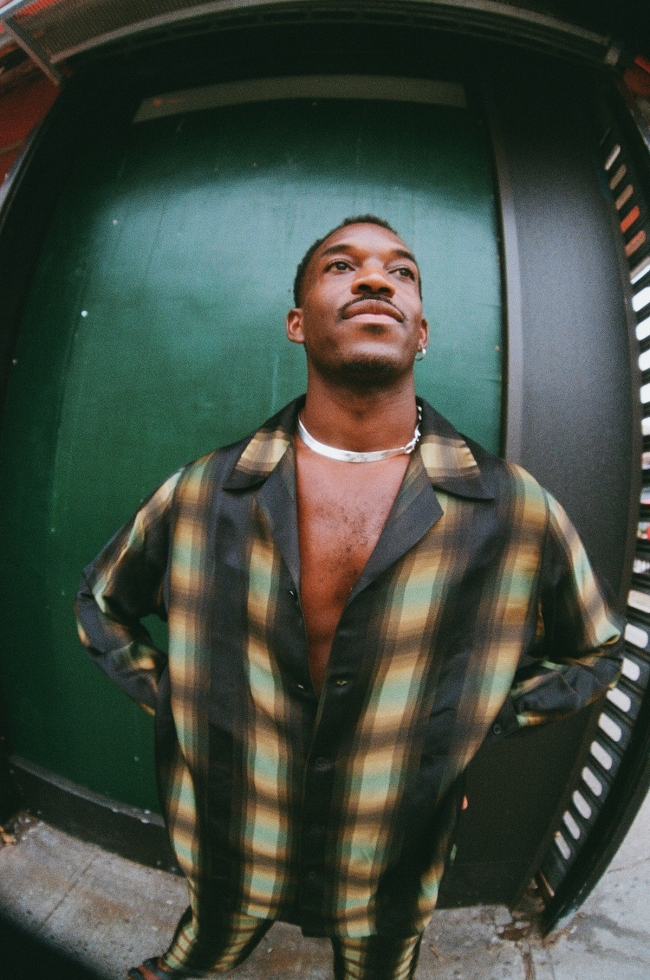
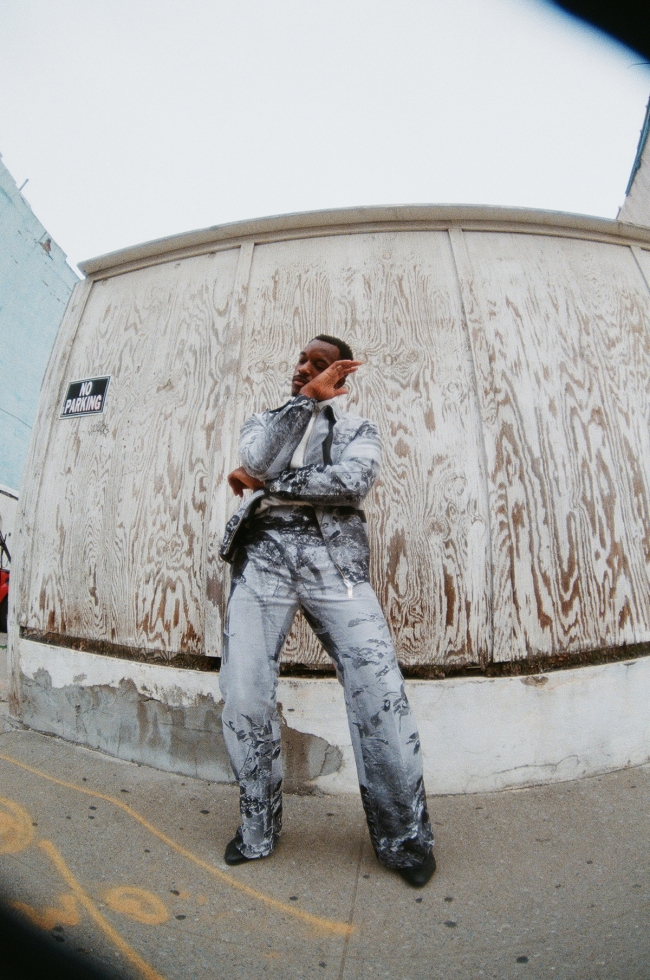
Above Left: Britton wears Suit and Shirt by Taakk, Sandals by Birkenstock and Jewellery by Martine Ali
Above Right: Suit by Taakk, Shoes are Britton's own and Jewellery by Martine Ali
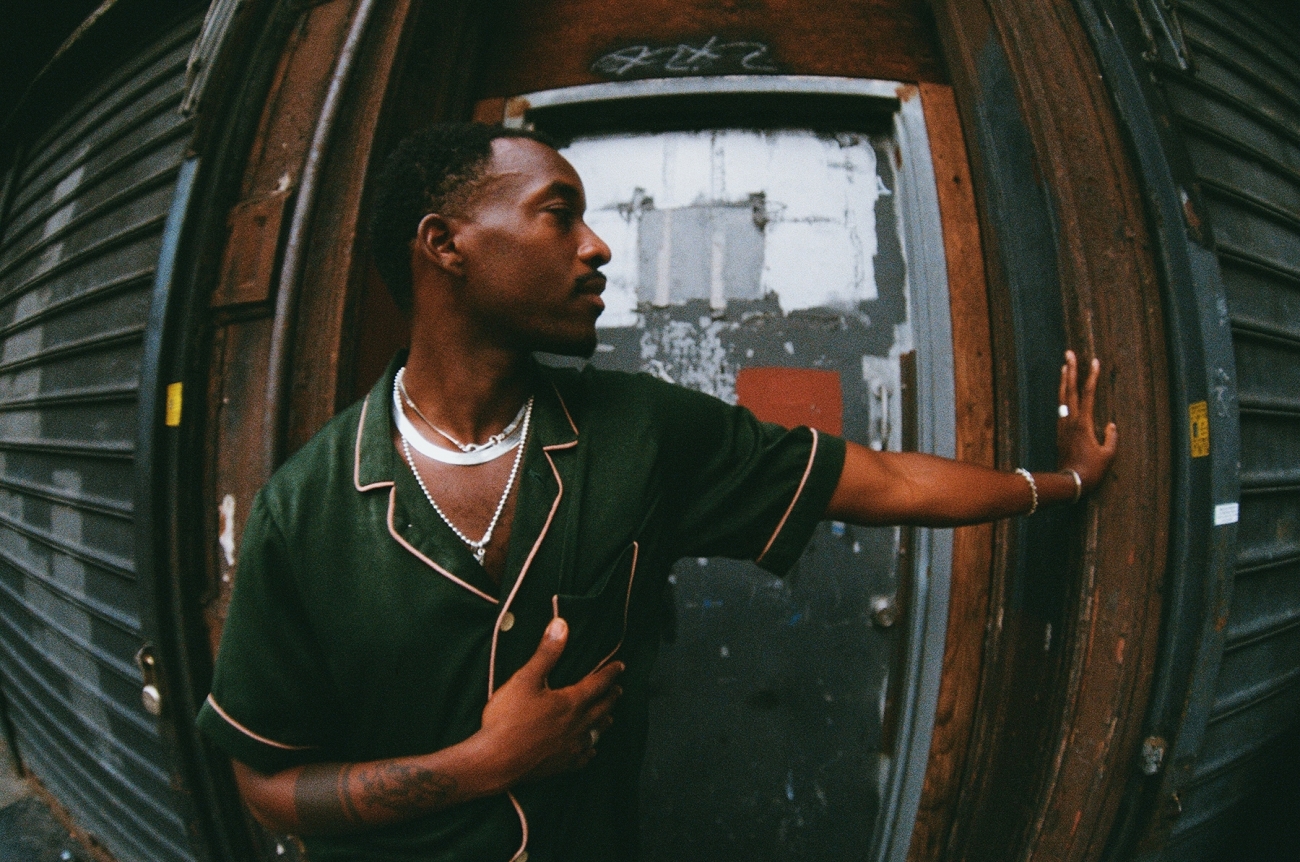
Above: Shirt by Palmiers du Mal and Jewellery by Martine Ali

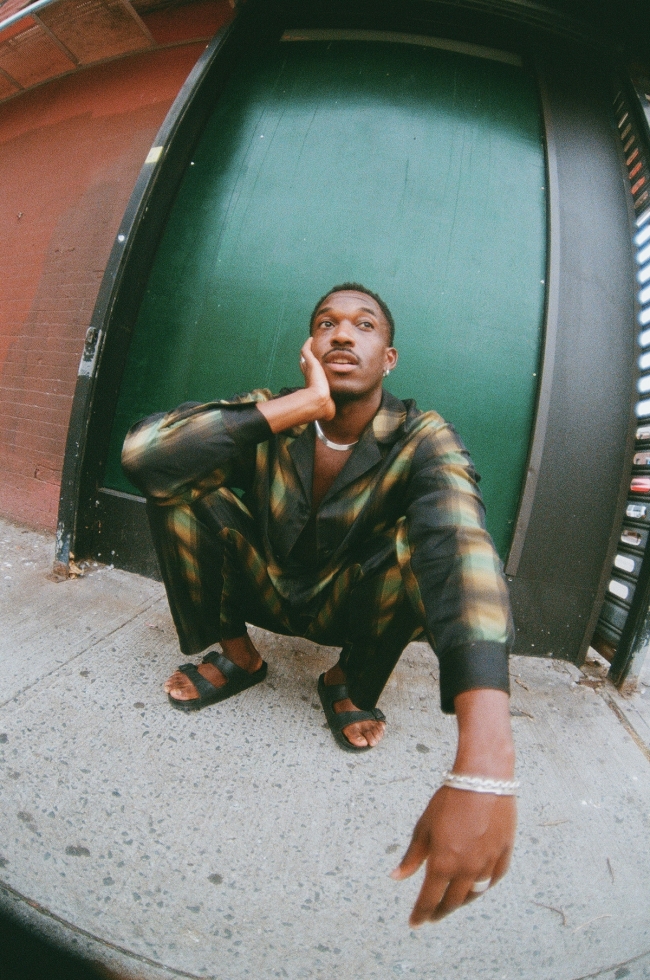
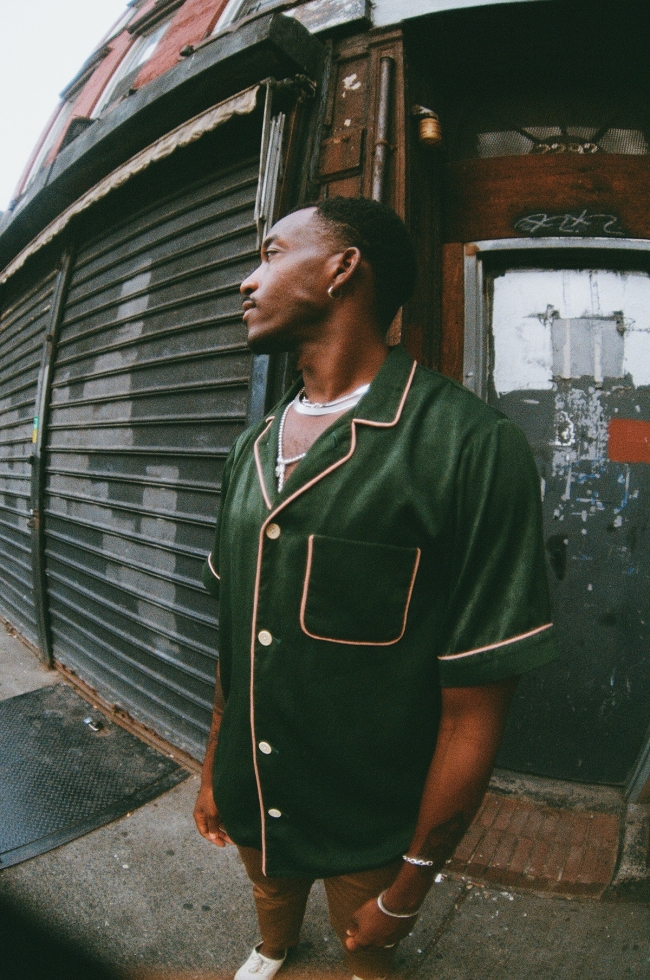

Above Left: Shirt by Palmiers du Mal, Trousers by Diesel and Jewellery by Martine Ali
Above Right: Outfit as Before

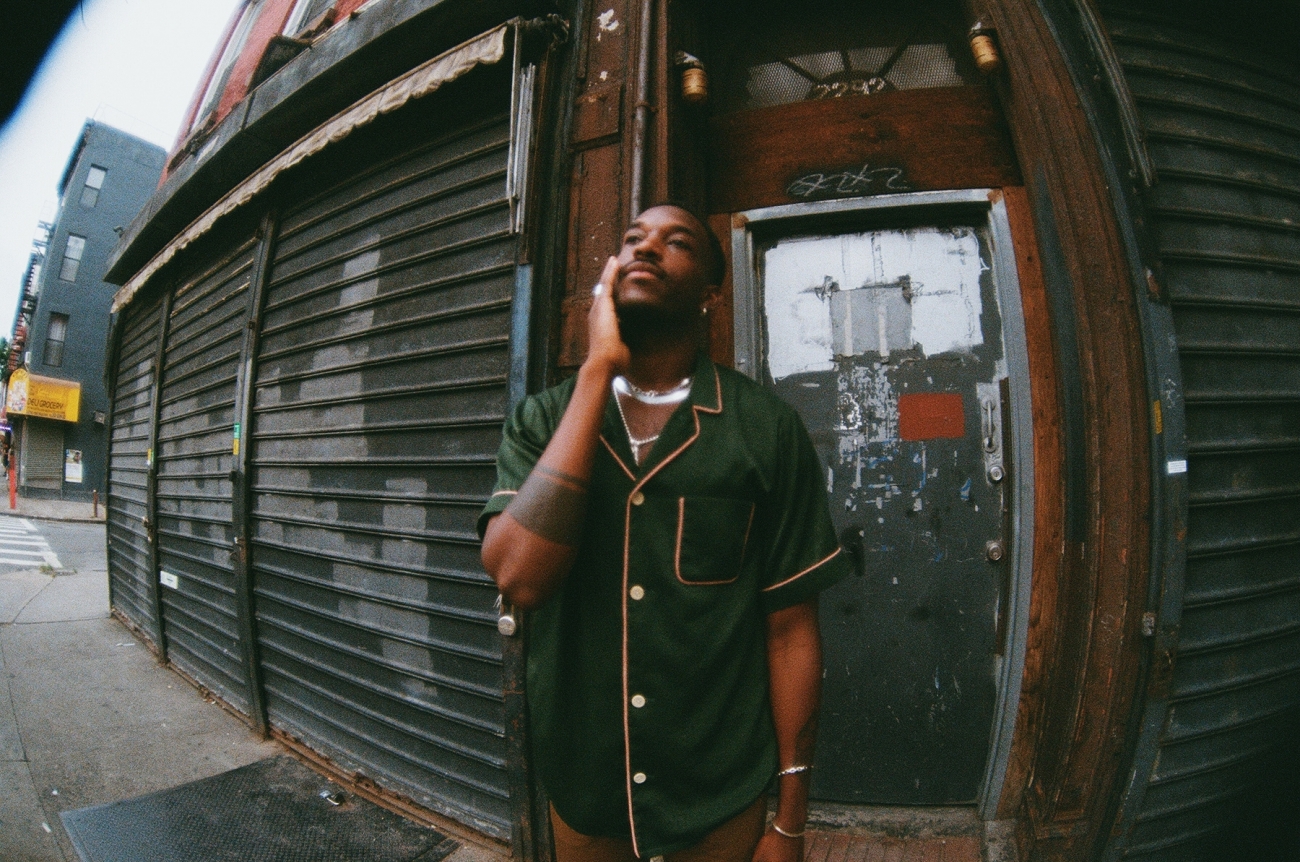
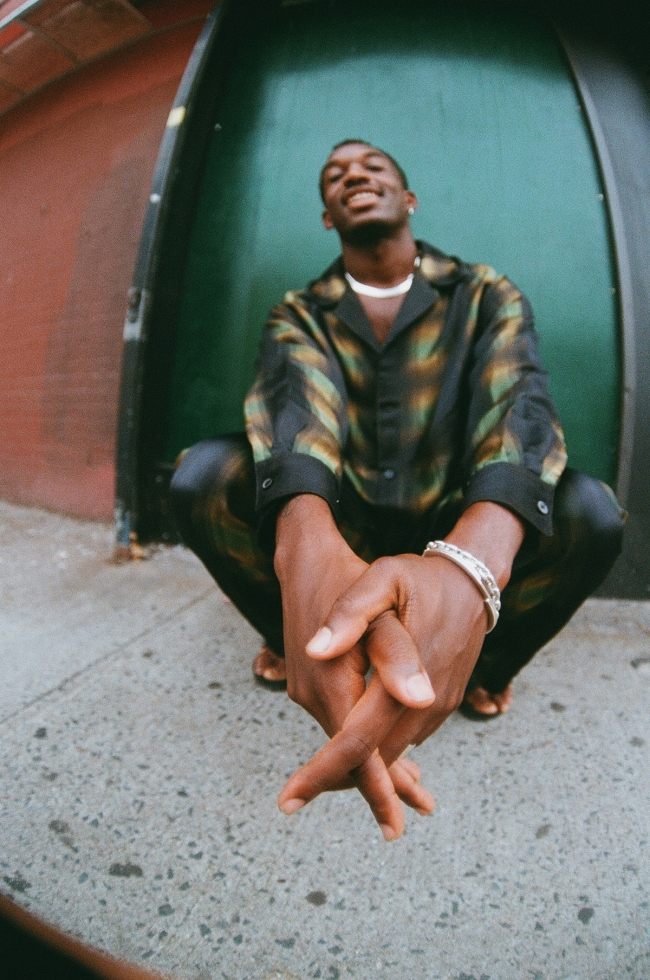
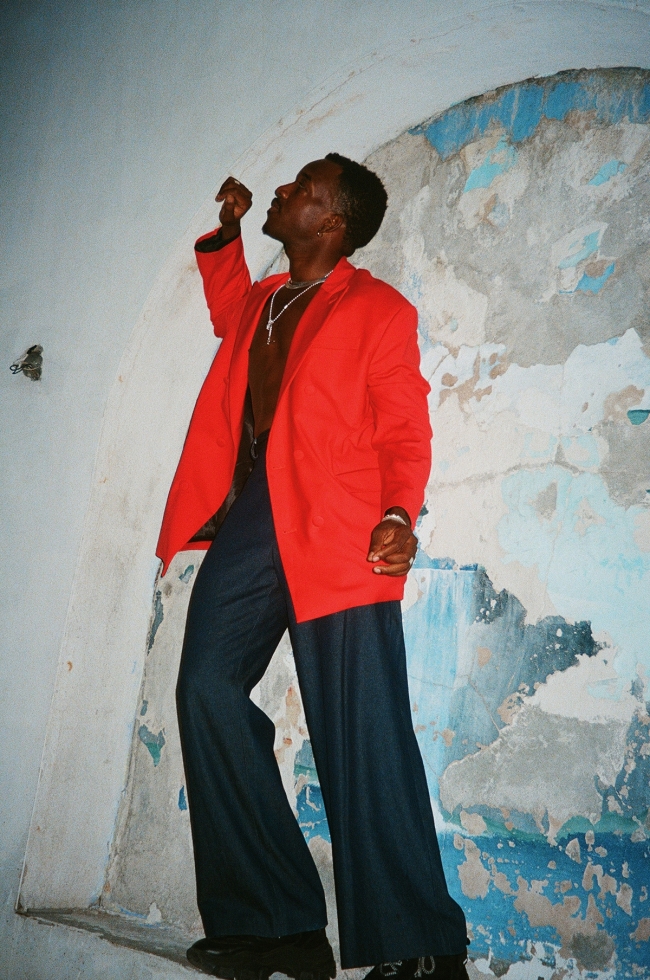
Above Left: Outfit as Before
Above Right: Blazer by Daily Paper, Trousers by Palmiers du Mal and Jewellery by Martine Ali
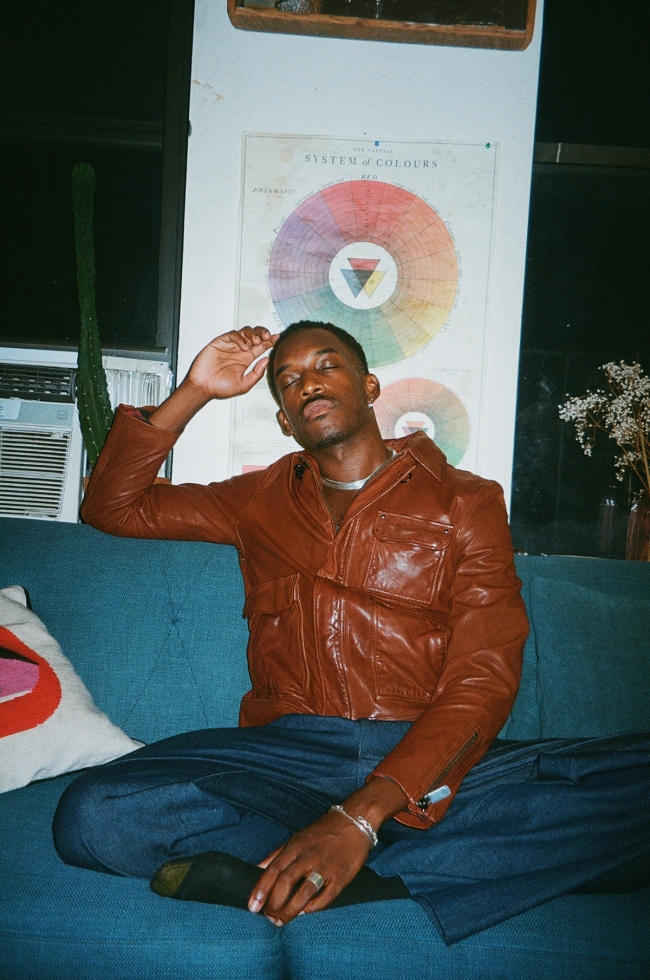

Above Left: Jacket by Diesel, Trousers by Palmiers du Mal and Jewellery by Martine Ali
Above Right: Outfit as Before


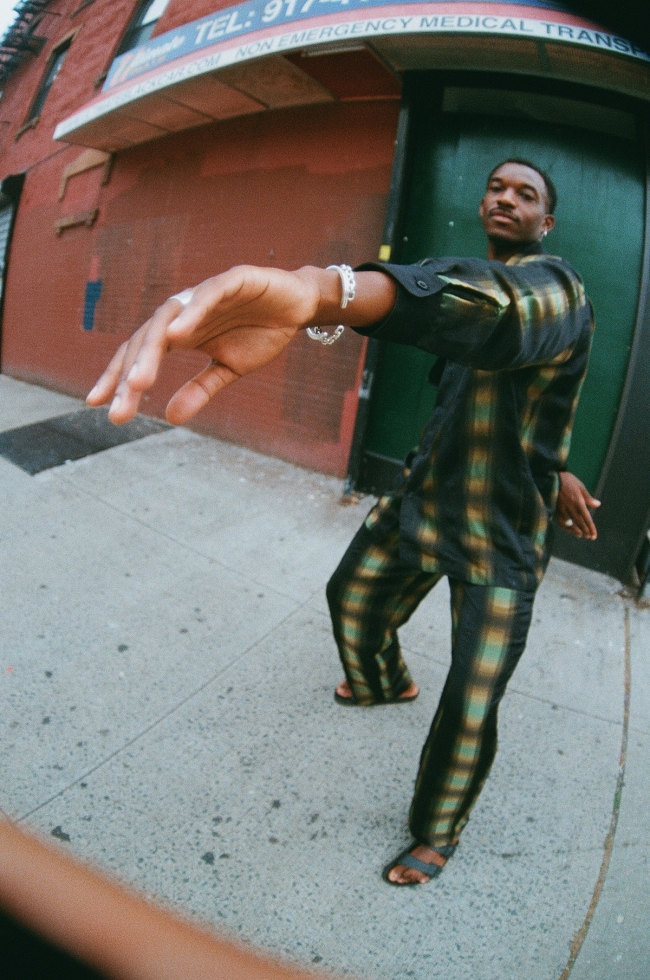
Above Left: Shirt by Daily Paper and Jewellery by Martine Ali
Above Right: Outfit as Before

